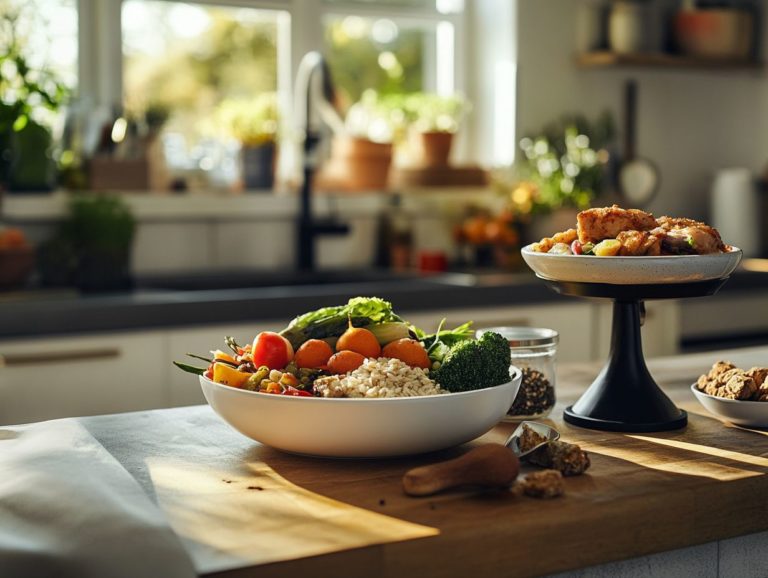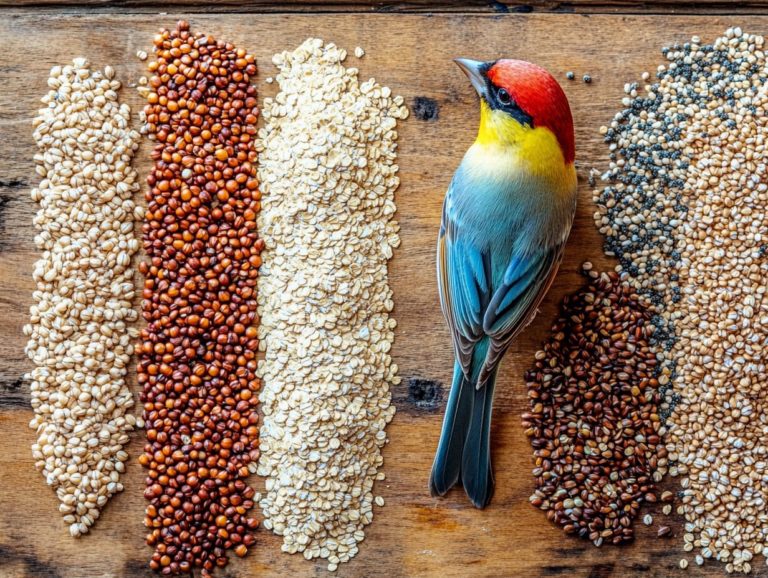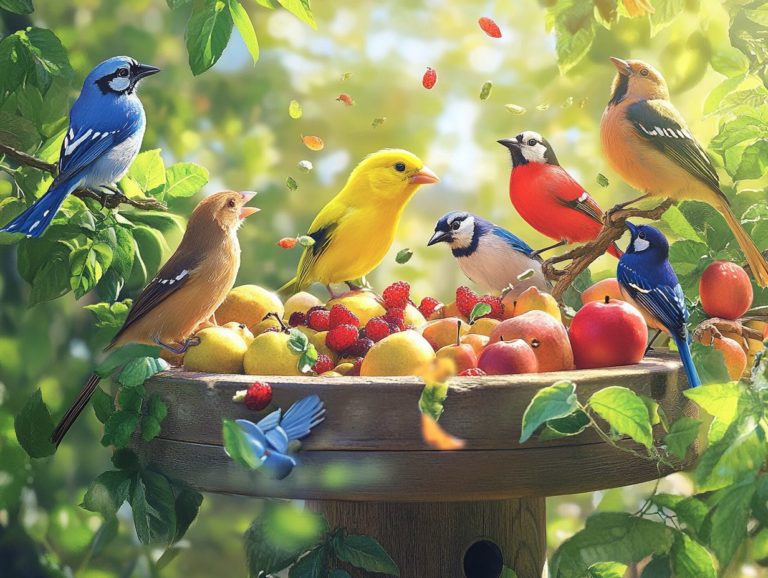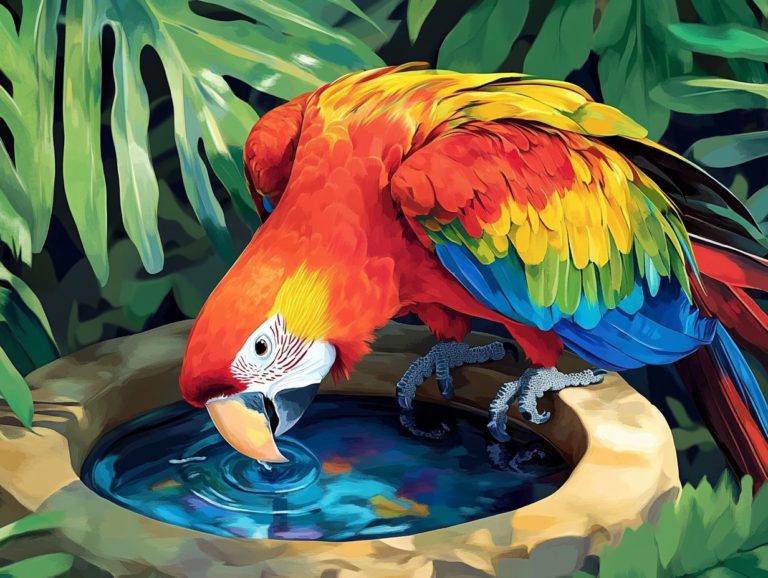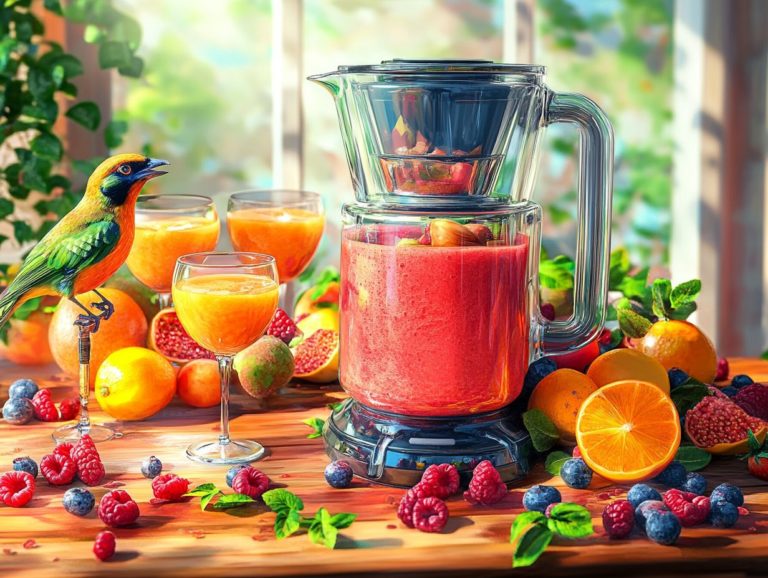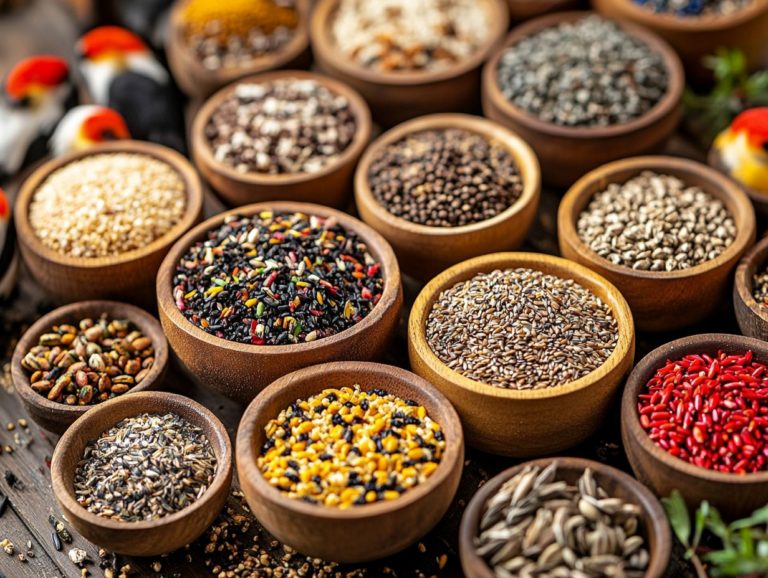The Benefits of a Varied Diet for Pet Birds
A varied diet is essential for the health and happiness of your pet bird, whose nutritional needs are often overlooked. Just like you, birds flourish on a balanced selection of foods that deliver essential nutrients, ensuring proper nutrition and good health for your feathered friends.
Get ready to discover the secrets to keeping your pet bird vibrant and energetic! This guide will walk you through the specific nutritional requirements that keep your feathered friend vibrant and energetic, focusing on the nutrition pet bird owners need to know. You’ll learn about the benefits of diversifying their diet and receive practical tips on crafting balanced meals.
It will also highlight common pitfalls to avoid, ensuring your bird enjoys a long and healthy life, free from the risks associated with poor nutrition.
Immerse yourself in this guide to discover how you can elevate your pet bird s diet today, enhancing their overall health.
Contents
- Key Takeaways:
- Why a Varied Diet is Important for Pet Birds
- Nutritional Requirements for Pet Birds
- The Benefits of a Varied Diet
- How to Incorporate Variety into Your Bird’s Diet
- Common Mistakes to Avoid
- Frequently Asked Questions
- What is the importance of a varied diet for pet birds?
- What are the benefits of offering a varied diet to pet birds?
- What food items should be included in a varied diet for pet birds?
- How often should a pet bird’s diet be varied?
- Can a varied diet help prevent obesity in pet birds?
- What are some tips for introducing a varied diet to pet birds?
Key Takeaways:
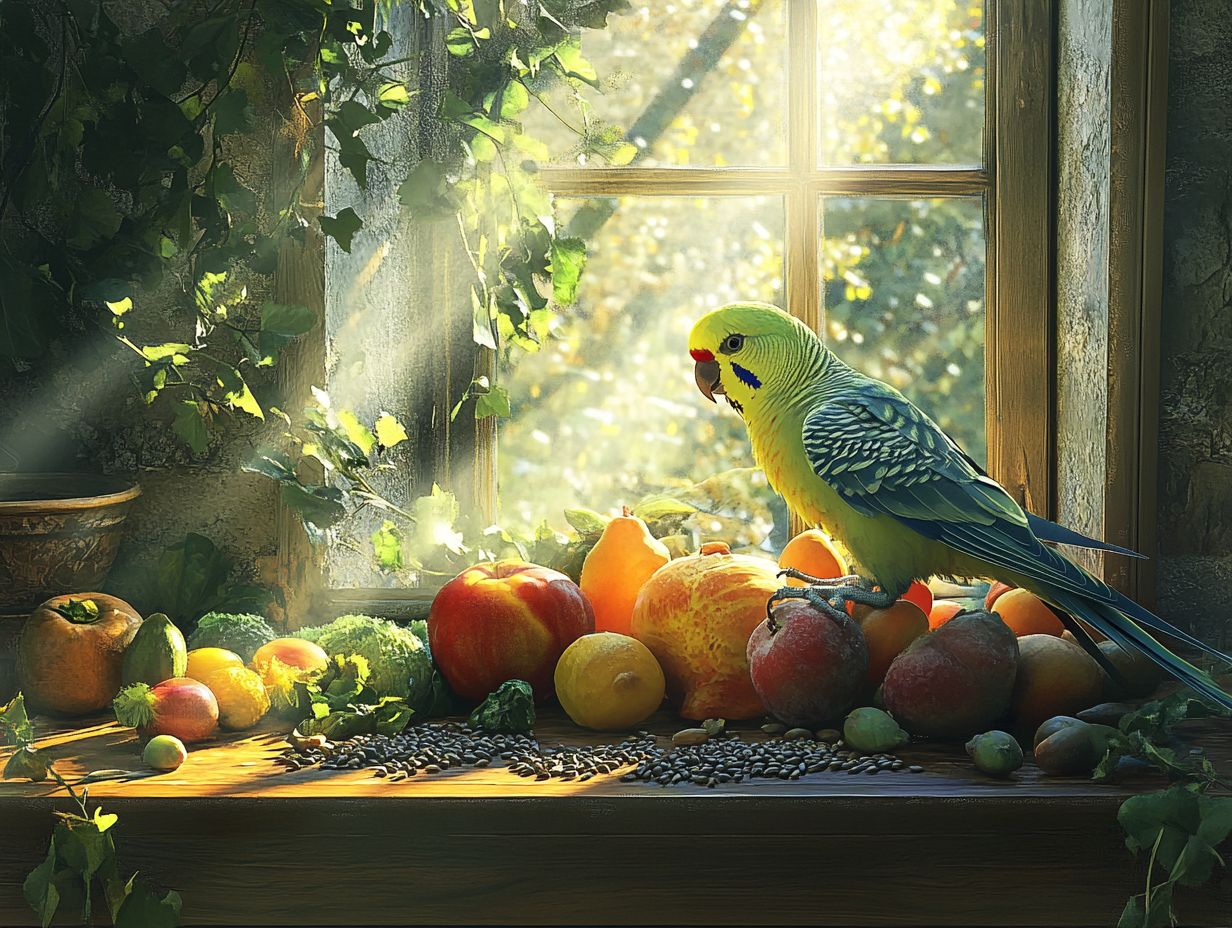
- A varied diet is crucial for the health and longevity of pet birds, providing essential nutrients, including vitamins and minerals, and preventing deficiencies.
- Incorporating a variety of foods into your bird’s diet improves their overall health and prevents common mistakes, such as overfeeding or underfeeding, ensuring a balanced diet rich in carbohydrates and fiber.
- To create a balanced meal plan, offer your bird a mix of fruits, vegetables, grains, nuts, and high-quality pellets or seeds, including options from brands like Lafeber, Harrisons, Kaytee, and Zupreem.
Why a Varied Diet is Important for Pet Birds
A varied diet is essential for the overall health of your pet birds, ensuring they receive the vital nutrients necessary for optimal growth, development, and disease prevention. By providing a diverse selection of foods such as seeds, fresh fruits, and vegetables you can significantly enhance your birds’ nutrition and promote a well-rounded diet.
This strategy not only supports the health of canaries, finches, and parrots but also helps avert the negative consequences of poor nutrition, which can lead to a range of health issues over time.
Nutritional Requirements for Pet Birds
Grasping the nutritional needs of pet birds is crucial for pet bird owners who wish to offer the best possible care. This ensures that they support the health and vitality of their feathered friends.
Whether you have a parrot, canary, or finch, it’s important to provide a balanced diet full of essential vitamins, minerals, carbohydrates, and fiber to help them flourish. Vital components such as water-soluble vitamins, macro minerals, and micro minerals are key in preventing nutritional deficiencies, ensuring your cherished companions lead healthy and active lives.
Essential Nutrients for Optimal Health
For your pet birds to achieve optimal health, it’s essential to provide a diet rich in important nutrients. This means ensuring they get a variety of vitamins, minerals, amino acids, carbohydrates, and lipids. These nutrients not only enhance the physical well-being of your birds but also support their mental health and overall vitality.
By incorporating high-quality pellets, pigeon seeds, and fresh fruits and vegetables, you can meet all their nutritional needs and prevent potential health issues from nutrient deficiencies.
Vitamins like A, D, E, and K are crucial for vision, bone health, and immune functions, while B vitamins play a key role in energy metabolism and feather health. Minerals such as calcium and phosphorus are necessary for strong bones and proper muscle function, with calcium being especially important for female birds during egg-laying.
High-quality pellets are often fortified with these essential vitamins and minerals, offering a convenient and balanced option that supports the health of pet birds.
By supplementing their diet with a vibrant array of fresh produce think leafy greens, bell peppers, and berries you not only enhance their meals but also boost their nutrient intake, fostering a lively and thriving pet bird.
Start today! Elevate your bird’s diet to boost their health and happiness!
The Benefits of a Varied Diet
A varied diet unlocks a world of benefits for your pet birds. It enhances their health and longevity while minimizing the risk of nutritional deficiencies.
By adding a diverse array of food options like seeds, nuts, grains, and fresh produce you can provide exceptional nutrition that meets multiple dietary needs. This ensures that your feathered companions thrive with vibrant health and vitality.
This approach makes mealtime an engaging experience. It stimulates your birds both physically and mentally, offering an array of feeding practices that keep their aviary life rich and fulfilling.
Improved Health and Longevity
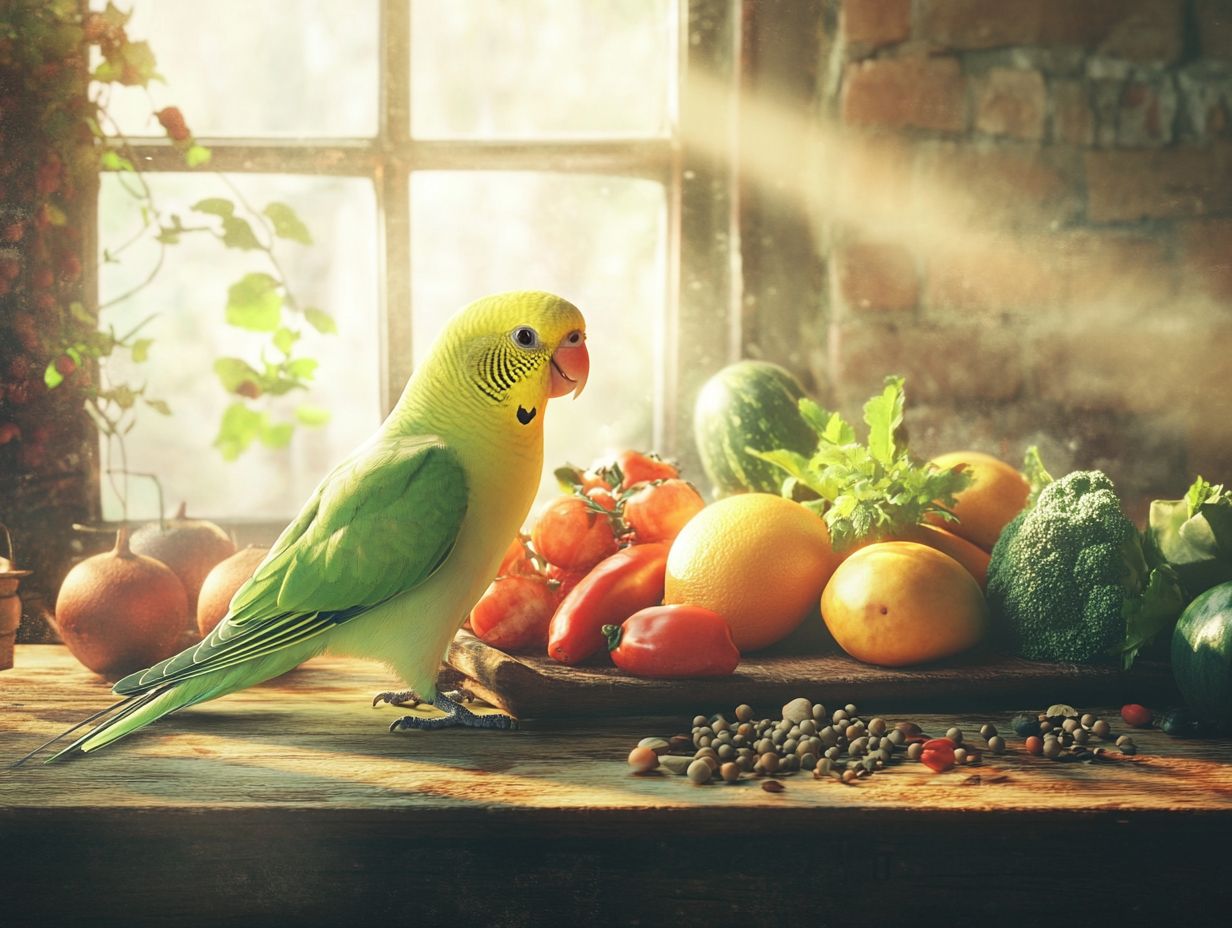
Improved health and longevity in your pet birds can be directly linked to using a varied diet tailored to their unique nutritional needs. As a pet bird owner who prioritizes good nutrition with diverse food offerings, including essential vitamins and minerals, you will witness remarkable enhancements in your birds’ energy levels, plumage quality, and overall well-being.
This active choice encourages longer lifespans and fosters a healthier environment that reduces the risks associated with poor nutrition.
By incorporating a mix of fresh fruits, vegetables, and nutritional bird food made from various ingredients, you ensure your feathered friends receive essential nutrients that bolster their immune systems.
For example, foods rich in vitamin A, like carrots and spinach, support eye health, while omega-3 fatty acids fats that are important for good health found in flaxseed contribute to shiny feathers. A varied diet can prevent boredom and stimulate their natural foraging behavior, promoting mental health and overall vitality in pet birds.
Regularly changing the menu keeps your pets engaged and physically active, leading to a more vibrant and fulfilling life. This ultimately reinforces the connection between diet and longevity.
Prevention of Nutritional Deficiencies
Preventing nutritional deficiencies in your pet birds is essential for maintaining their health and vitality. You need to provide a well-rounded diet that includes all the crucial nutrients necessary for their growth.
This highlights the importance of variety in their diet. Pet birds flourish on a diverse selection of foods, including fresh food for birds, that fulfill their nutritional requirements and encourage their natural foraging instincts.
By offering a blend of high-quality pellets, seeds, fresh vegetables, and fruits, you can ensure your feathered companions receive adequate amounts of vital nutrients such as calcium, vitamins A, D, and E, along with essential fatty acids.
Understanding the dietary preferences of different species can help you prevent deficiencies. This allows your pet birds to display vibrant plumage and cheerful behaviors. A proactive approach to their nutrition fosters longevity and enhances the overall quality of life for these cherished companions.
How to Incorporate Variety into Your Bird’s Diet
Incorporating variety into your bird’s diet is an essential practice that elevates their dining experience while ensuring they receive the vital nutrients necessary for a vibrant, healthy life. As a discerning pet bird owner, you can achieve this by introducing an array of food types like pigeon seeds, a selection of nuts, and a colorful medley of fresh fruits and vegetables.
These can be effortlessly integrated into a well-balanced meal plan. By taking the time to understand the dietary preferences and specific needs of your bird species, you can tailor your feeding practices to promote their overall health and well-being.
Start today by exploring new foods for your feathered friends!
Types of Foods to Offer
Offering a variety of food types is vital for your bird s happiness. It ensures your pet birds enjoy a well-rounded diet that meets their nutritional needs.
Start with high-quality pellets as a foundation. They provide essential vitamins and minerals.
Pair that with fresh greens like kale and spinach, packed with fiber and nutrients. Adding fruits such as apples, berries, and bananas introduces natural sweetness while bringing in antioxidants that support overall health.
A small handful of nuts can be an excellent source of energy. You can offer seeds in moderation to indulge their natural foraging instincts.
By diversifying these food options, you help your feathered friends maintain optimal health. They will thrive in their environment and enjoy a delightful culinary experience.
Creating a Balanced Meal Plan
Creating a balanced meal plan for pet birds is essential for their health and well-being. It also provides structure to their feeding routines.
As a pet bird owner, consider the unique dietary needs of your feathered friend. Incorporate elements like pellets made specifically for birds, fresh fruits, and vegetables to achieve optimal nutrition.
A thoughtfully crafted meal plan simplifies feeding. It fosters consistency in providing essential nutrients that support your bird’s overall health and vitality.
Start by researching the specific dietary requirements of your bird’s species. Different birds, like parrots, canaries, and finches, have varying needs.
Next, assess their individual preferences. Some birds might have a fondness for certain fruits or seeds, enhancing their dining experience.
Careful portion control is crucial. It helps ensure that the diet doesn t lead to obesity or malnutrition.
Offering various foods keeps mealtime exciting for your bird! Regular consultations with bird doctors will help you adjust the diet as needed.
Common Mistakes to Avoid
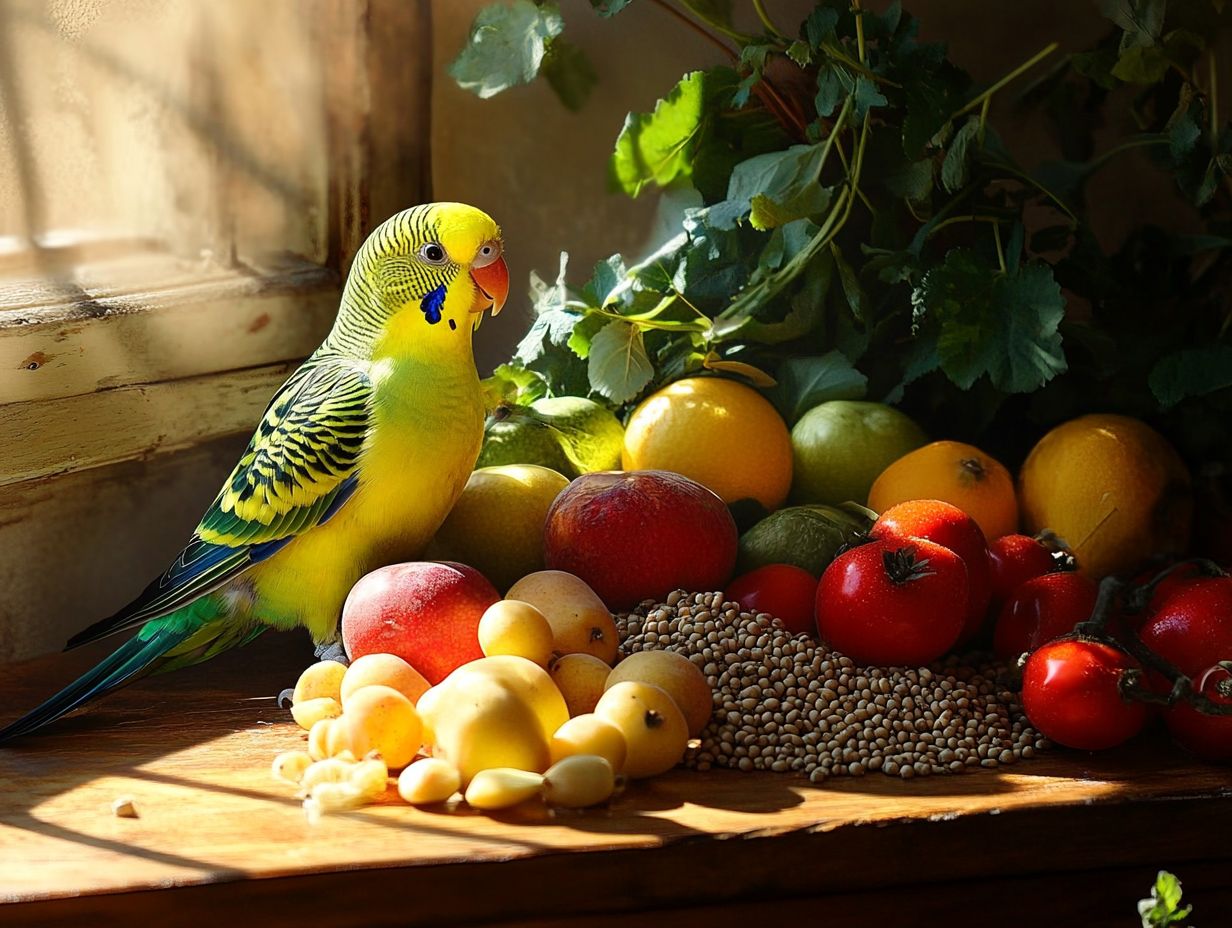
Regarding feeding your pet birds, avoiding common mistakes is vital for their health and well-being. Don t let these common feeding errors jeopardize your bird s health!
Many pet bird owners grapple with the challenges of overfeeding or underfeeding. These practices can disrupt their birds’ nutritional balance.
Offering human foods that aren’t suitable for birds can amplify potential health risks. This highlights the importance of careful consideration when crafting an appropriate diet for your feathered companions.
Overfeeding and Underfeeding
Overfeeding and underfeeding are common pitfalls that can greatly affect the health of your pet bird. Balanced feeding practices are a necessity.
To keep your feathered friend at a healthy weight, measure out portions tailored to your bird’s specific species, age, and activity level.
Offering a diverse range of fresh fruits, vegetables, and fortified pellets ensures your bird gets a well-rounded supply of essential vitamins and minerals.
Pay close attention to your bird’s behavior and physical appearance. Signs of lethargy might suggest overfeeding, while a ruffled appearance could indicate underfeeding.
Establishing a feeding schedule and consulting with a bird doctor for personalized dietary advice can significantly elevate your pet bird’s quality of life. This minimizes the risks linked to obesity and nutritional deficiencies.
Feeding Human Foods to Birds
Feeding human foods to pet birds can present significant risks to their health, as many common items simply aren’t suitable for bird consumption. As a pet bird owner, it s crucial to be cautious in your feeding practices. Certain human foods might not provide the right nutrients or even lead to poisoning.
By prioritizing appropriate and safe food options, you can ensure the well-being of your feathered friends and foster a thriving bird-friendly environment.
For example, while some fruits like apples and blueberries can provide beneficial vitamins and antioxidants for your birds, others like avocado and chocolate are toxic. Salty and sugary snacks may seem tempting but can cause severe health issues such as obesity and heart disease.
Understanding which foods are safe and which can cause harm is essential for any bird owner who wants to keep their pets healthy and happy.
Research the specific dietary needs of your bird species and always consult with avian veterinarians before introducing any new foods. This diligence ensures that your feathered companions thrive under your care.
Frequently Asked Questions
What is the importance of a varied diet for pet birds?
A varied diet is essential for the health and well-being of pet birds, just as the importance of variety in bird toys ensures they receive stimulation and enrichment for proper growth and development.
What are the benefits of offering a varied diet to pet birds?
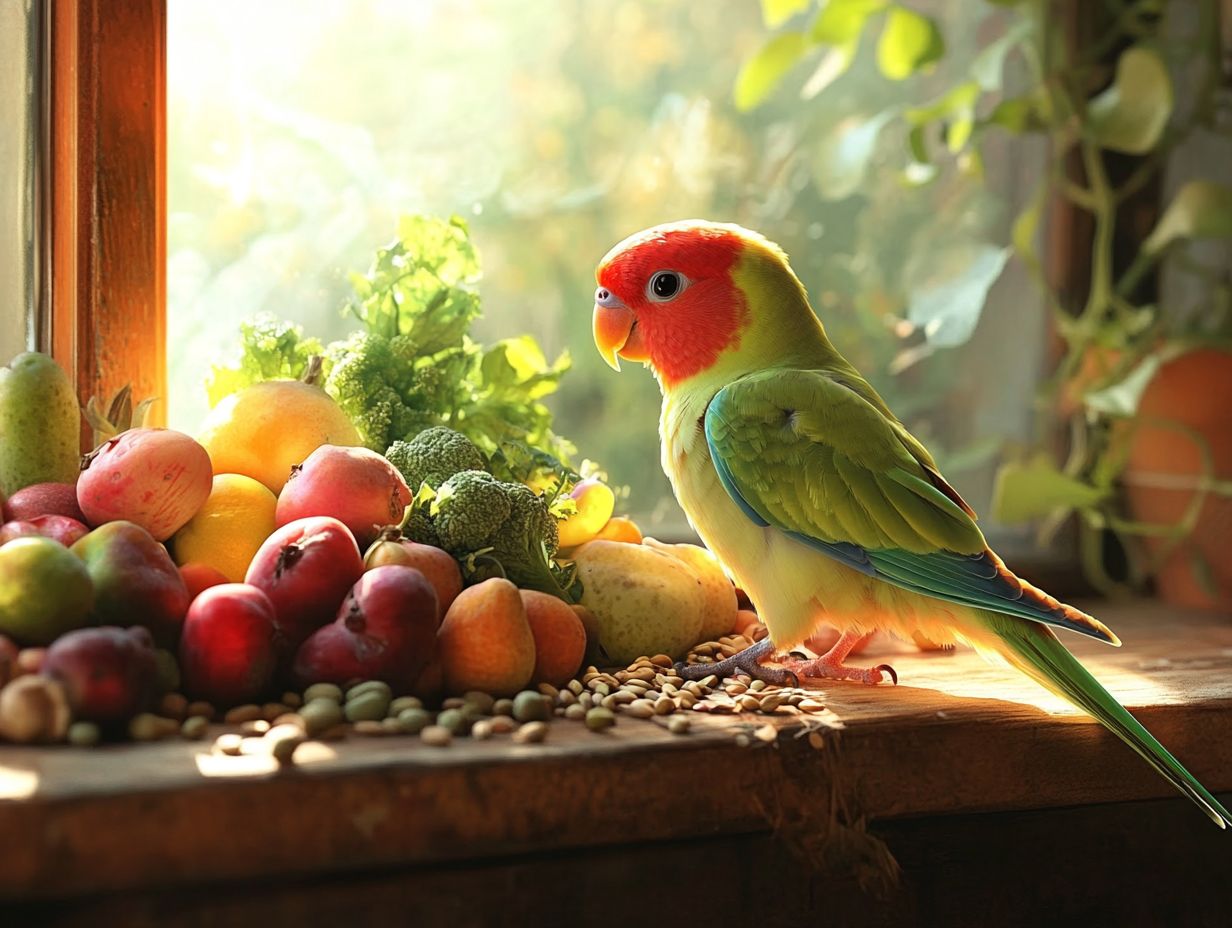
Offering a varied diet to pet birds is crucial for promoting better overall health, increased energy levels, and a stronger immune system. Including fresh fruits in their diet also helps to prevent nutritional deficiencies and associated health problems.
What food items should be included in a varied diet for pet birds?
A varied diet for pet birds should include a mix of fruits, vegetables, grains, and protein sources such as seeds, nuts, and insects. It is important to offer a variety of these food items to ensure a balanced intake of nutrients.
How often should a pet bird’s diet be varied?
Ideally, a pet bird’s diet should be varied on a daily basis. This allows for a more diverse intake of nutrients and prevents boredom with the same food items every day.
Can a varied diet help prevent obesity in pet birds?
Yes, a varied diet can help prevent obesity in pet birds. By offering a mix of healthy food items, pet birds are less likely to overeat and consume excess calories, which can lead to obesity.
What are some tips for introducing a varied diet to pet birds?
Introduce new food items gradually and in small portions. Observe your pet bird’s reactions and adjust the diet accordingly. Also, make sure to offer a variety of textures and colors to keep the diet interesting and appealing to your pet bird.
Don t wait! Start incorporating a variety of foods today to ensure your pet bird lives a long, healthy life!

